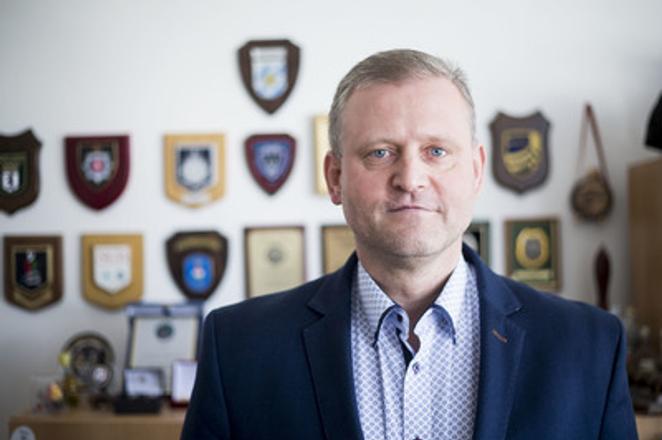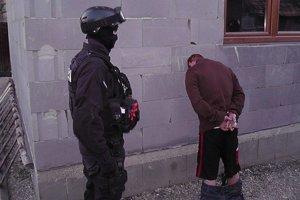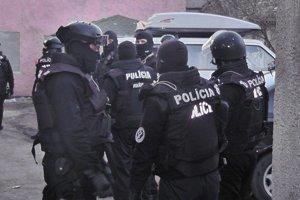Human traffickers abuse the credulousness of people. If someone gets into their hands, the crucial thing is to wait for the moment when their watchfulness eases up, Adrián Begáň, head of the National Unit for the Fight against Illegal Migration of the Police Corps’ Presidium, told Sme.
Sme: Are people trafficked in Slovakia?
Adrián Begáň (AB): Slovakia can be perceived as a source country where the victims come from; and, of course, we also have perpetrators of these criminal activities here. They usually work in international groups, though. This is also connected with demand and supply; there is demand for people who could be enslaved abroad and in Slovakia, we have a group of citizens from which victims can be supplied.
Sme: Can you be more specific?
AB: Generally, we can say that a good environment for human trafficking can be found where socially dependent people live, where there is a lower level of education, weaker language skills and an environment where poor health- or physical impairment exist. The perpetrators themselves live in this environment. They are part of organised groups, and they select specific victims according to specific requirements.
Sme: What and who is most in demand?
AB: Victims for sexual exploitation are most in demand, with work exploitation second, followed by forced marriages and forced begging.
Sme: What course does human trafficking take?
AB: Victims are usually lured by the prospect of a lucrative job offer abroad. They are promised a very well-paid job, to be cared for, etc. In many cases, the victims do not even know what specific job is waiting for them. The recruiter entices them, promises a better life and secures the transport. On site, the victim is welcomed by someone else.
Sme: Do such slavers even pay the transport for their victims?
AB: Yes, they cover the price of a car ride, or even a plane ticket. They do so under various pretences, like this is advanced pay which will later be deducted from their salary. They also give victims some money for elementary clothing, food and shoes. The beginning is very impressive, and victims get the impression that someone wants to take care of them. Then, in the foreign country, under the pretence of arranging for social benefits or official registration, they strip their victims of identification documents, and their ordeal begins. If the person does not agree, they are beaten and some are raped.
Sme: Do the victims also get a fictitious work contracts before they leave their homes?
AB: No, it is always based on the claim that specific things must be agreed upon abroad. If they had specific contracts, the victims might consult with someone or compare their contracts with other offers. The goal is to give as little information as possible, which we could trace.
Sme: Where do Slovaks end up most frequently?
AB: For sexual exploitation and forced marriages, the UK is evidently the winner, while for begging, Germany and Austria take the lead.

Sme: How much do foreigners pay for a woman forced to marry?
AB: We have had cases where it was as much as 7,000 pounds, but even as much as 20,000 pounds is known of. For the bridegroom to recoup his losses, he often forces his wife to offer sexual services for money and he himself becomes a slaver.
Sme: Who is the victim when it comes to forced labour?
AB: Here, it is mostly men, most often young and strong – but it is no exception that men in their forties are also victims. In most cases, they end up in the UK, in butcheries, slaughterhouses, or poultry processing plants.
Sme: Do these people get at least a minimum percent of the salary to survive?
AB: First of all, these people have had their documents taken from them, so that they are not able to leave. They are also illegally restrained; they are driven to and from work by members of the organised group, and they cannot move freely. They work 12 to 16 hours a day, seven days a week to earn as much as possible. They are hidden in shabby places – various shanties, old hostels. Often, they have access to personal hygiene facilities just once a week. They get food – lousy- just once a day. The goal is to maximise profit and decrease costs. They do not need people to feel well, but to keep them in such a state that they can work.
Forms of modern slavery
Sme: How does forced begging work?
AB: Forced begging concerns mostly the south of central Slovakia. Perpetrators seek mainly for physically handicapped people, invalids or the homeless who have some visible handicap. They strive to evoke compassion. Then they export these people, mostly to Germany or Austria, where they must beg in the streets for as many as 16 hours a day. They seek lucrative and frequented places.
They sleep in tents, under bridges, at bus stops, etc. However, they are always overseen by a guard who controls them all the time. He also takes their earnings and gives them food or alcohol – once daily. The practice is that first, they make these people addicted to alcohol. The perpetrators take them to their place for a few days, put them in garages or outbuildings, and make contact with them.

Sme: Why do these people not run away, or tell someone they are enslaved? Like women who are forced into sex?
AB: Let us not forget they do not speak the language, have no documents, they are in a strange environment and guarded all the time. They see the outside world only through a window. There are some attempts, no doubt. They may put a sign, „help me “, in the window – but the slavers try to eliminate any possible contact with the surrounding world.
Sme: What happens in the meantime in Slovakia? Are these people searched for, or are they forced by slavers to pretend to their family that everything is OK?
AB: Naturally, these people do what they can to prevent the truth getting out. They let girls call home but they write down what they can say in advance – and the girls make the calls with a knife at their throats. Victims are permanently in fear for their lives.
Sme: Is it rare that a person stops communicating totally and the family report them as missing?
AB: Yes. The goal of this type of slavery is for the victim to make as much profit as possible, and for the longest time possible, even for several years. Thus, some type of contact is preserved in almost all cases.
Sme: How often does it usually take before a slave manages to flee, or to somehow get loose?
AB: Most often, it takes two, maximum three years. We do not have any older cases. During this time, the watchfulness and constant alert usually eases. Over the course of time, the surroundings become familiar. We also have cases where we have been contacted by British citizens who notice suspicious things in their neighbourhood; for example, when 10 to 12 clients daily visited an enslaved woman offering sexual services.
Sme: What is the cooperation like between Slovak and British police in busting international groups which sell people?
AB: Via Europol and Eurojust, Slovakia has launched a joint investigation team with the metropolitan police in London. It operates under the name Svanetia, and specialises in sexual exploitation and forced marriages.
Sme: Has it already brought specific achievements?
AB: We have busted a group of 12 criminals, of whom three were Pakistanis but the main organiser was a Slovak. Both in Slovakia and in the UK, a parallel operation took place, during which the police directly removed three victims from this environment. Based on exchange of evidence, there has been even been a trial already.
Of the 12 perpetrators, four were effectively sentenced by the royal court. The Slovak received an unconditional sentence of 10.5 years. One of the victims – a woman repeatedly brutally raped – brought the attention of the police to the whole case. She was raped so brutally that she almost bled to death – the perpetrators got scared and put her in a taxi which took her to a hospital.
Sme: Are there several such international teams?
AB: In October, a second investigation team called Synapsis, operating in Scotland, was established. In February, a joint action day took place in Glasgow, and in the Slovak town of Trebišov where nine gang members who recruited brides in Trebišov for weddings in Scotland were detained. We have identified 12 victims, and so far, 10 have been charged- out of that nine are Slovaks. However, the investigation is still ongoing.
Prevention and more
Sme: What is most effective in uncovering such cases?
AB: The same is true as for other crimes. Prevention is most important; meaning that people should prevent the possibility of becoming a victim of such behaviour.
To give your ID card to anyone abroad – this should not happen. Of course, when something like this happens you should try find a way to report the enslavement to the police.
Sme: What should such prevention look like?
AB: For the police, all information is crucial. For parents, it is good to be at least a bit suspicious. We find poor communication within families.
The young keep everything to themselves and are often not able to critically evaluate what is a realistic job offer – and what is not. Sometimes, it is enough for us to know the number plates of the car which took someone away. It is also good to know who takes the child, from which number he or she was called, or to arrange that the child for example calls once a day from abroad, at a certain hour. Or that he or she says a certain word at first, agreed on in advance.
We had a case when the information of a parent who noticed a non-standard communication on online chat, Pokec and on Facebook was a great help. The perpetrators lured girls aged 16 to 18 to work as hostesses in the Netherlands.
Later, however, they were forced into sexual intercourse. After this parent contacted us, we detained his daughter even before she was taken from Slovakia, directly on the border. Even planning this type of crime is illegal; it does not even have to be accomplished.
Sme: Have you experienced parents selling their own children?
AB: We do have such cases, in the settlements, although they are less frequent. I recall a case when parents sold their daughter even though they knew in advance she would be sexually exploited.
Sme: How much did they get for the daughter?
AB: We have figures from €3,500 to €20,000 for a person. This is individual, depending on the person and on how old he or she is, where they come from, and what the purpose of their work is.
Sme: Can it be assumed that Brexit will help stop human trafficking?
AB: It surely will, as the exit of the UK from the EU means there will be more stringent border checks. Thus, perpetrators will be in a worse position, as there will be a better track of who is entering the country.
But everything will depend also on demand. If there are many vacant job positions in the UK, and Britons are reluctant to do these jobs, there will be enough demand. Thus, foreigners will keep coming, and they will have their physical needs and thus, there will be a requirement for someone to offer sexual services. This is a wider summary of issues that are interconnected.



 Adrián Begáň (source: Sme - Gabriel Kuchta)
Adrián Begáň (source: Sme - Gabriel Kuchta)


